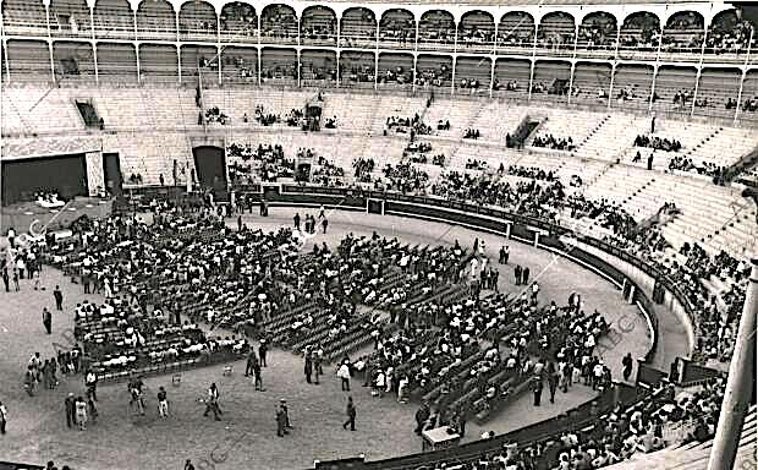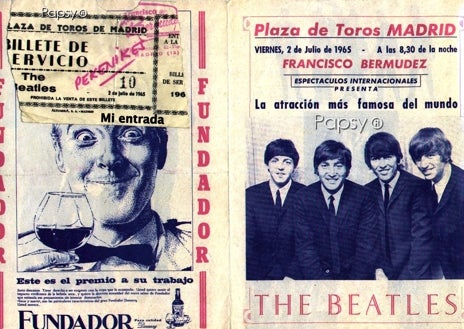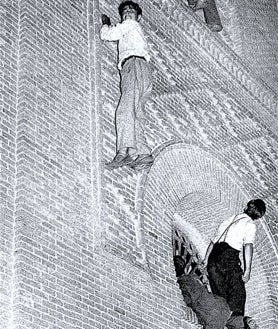The last Spaniard to open for the Beatles at Las Ventas speaks: "They sounded horrible."

It's only cosmic justice that the longest-running Spanish rock band, the one that has endured the most winds and tides to this day, should have the honor of having opened for the Beatles in the first of their only two concerts in our country . Los Pekenikes , formed in 1959 and therefore practically veterans in that summer of 1965 when the Fab Four landed in Spain, were chosen. Sixty years later, this is the story of the twenty-four hours that changed their lives, although they didn't know it at the time.
"We found out it was going to be us about a month in advance," recalls bassist and founder Ignacio Martín Sequeros, the last surviving member of the original lineup and possessor of an astonishing memory that allows him to recount every last detail of that feat. "At the time, our manager was Francisco Bermúdez , who was the one bringing the best foreign acts to Spain. He called us all saying he had some very important news to share, and he invited us to his offices, which were on the fifth floor of Gran Vía. "What's going on, Paco?" we said when we arrived. "You're going to play with the Beatles!"
Los Pekenikes knew the four from Liverpool had been touring the United States in stadiums, and poor things, they thought they'd cross the ocean to support them in some big city in the promised land of rock 'n' roll. "No, no, they're coming here, to Madrid!" Paco told us. We were very surprised. Here? To Spain? And where's the concert going to be? There's never been a concert for so many people! When he told us it would be at the bullring, we couldn't believe it. Nothing remotely like that had ever been done there."
Bermúdez, who was elated because he himself had organized everything with a total investment of nine hundred thousand pesetas ("a significant amount, but much less than what the Beatles were already earning at that time"), told them not to worry about anything, that everything would turn out perfectly. So the Pekenikes each returned home, "without giving it too much importance yet," says Martín Sequeros, and that night they slept as if nothing had happened.
"You have to keep in mind that the Beatles weren't that famous in Spain yet. Their music wasn't played on any radio station except La Voz de Madrid, thanks to the radio host Ángel Álvarez , who was the only one who played English and American artists," the bassist says. "Here, they were known more for their hair than for their songs, and in fact, the lack of awareness was so great that some media outlets made a mistake and announced that the Beatles from Cádiz were going to play, that they were just a band! (laughs)"
During the month they had to prepare their opening show, Pekenikes rehearsed thoroughly and bought some suits and shoes for the occasion , but the Regime spent almost the entire time debating whether to go ahead with the idea or back out. Manuel Fraga, the Minister of Information and Tourism at the time, was determined to hold the show to project an image of openness to the world, but the Ministry of the Interior resisted giving final permission until the week before. According to legend, the approval came because Queen Elizabeth II had just decorated the Beatles as Knights of the Order of the British Empire. They were no longer just any long-haired band, and denying them entry could be interpreted as a diplomatic conflict.
"As the day drew near, the nerves grew and grew, which is normal, I think," laughs Martín Sequeros. "It wasn't just opening for the Beatles anymore; it was a new, unique experience, and we had no idea how it would turn out. But I insist, we had no idea that we were going to play with what would become the most important band of the 20th century."
On July 1, 1965, the Beatles' plane landed at Barajas Airport at 5:40 p.m. , with a couple of hundred fans waiting for them under a scorching sun. A Cadillac took them to the Gran Meliá Fénix Hotel in Plaza de Colón, where a press conference was held with absurd questions like "Do you have your hair insured?" and then an extravagant event sponsored by the Sherry Institute, which brought barrels of fino sherry to serve the rock stars. "Paul, John, George, and Ringo signed autographs on the four barrels, but then something very strange happened," says Martín Sequeros. "Two of them ended up in a winery in Jerez, but the other two disappeared without a trace, and to this day no one knows where they are. There must be someone out there who has them..."
That afternoon, Pekenikes spent transporting their equipment to the bullring and performing their sound checks. "It was the first time I entered Las Ventas, and I was amazed, of course," says Sequeros, who then returned home and slept peacefully again, unaware of being on the eve of one of the most important days of his life. "It didn't keep me awake at night. It may seem crazy to say this, but honestly, at that moment, it was just an anecdote for us. The next morning, I woke up, had breakfast, went to a class I had, and after lunch, I met up with my classmates to go to the bullring. We went calmly, and I was sure of what we were going to do."
Upon arriving at Las Ventas, Martín Sequeros was dumbfounded by the scene. "It was all gray, there were so many of them! But what astonished me most was that when I looked up at the square's exposed brick facade, I saw some kids climbing like cats to get into the concert . As I was told later, the police had orders not to use their guns under any circumstances, among other reasons because there was a lot of foreign press there as it was an event that had never taken place in Spain. And of course, with their batons, they couldn't do anything to stop the kids from continuing to climb the wall. So all they could do was shout, shout, and shout. 'Get down from there, you bastards!' It was quite comical, although also dangerous. What a mess it was!"



Once inside, one of the Pekenikes attempted the feat of sneaking into the Beatles' dressing room to meet them in person. "It wasn't a dressing room because there wasn't one! They put them in the infirmary where they treated bullfighters who were gored!" Martín Sequeros points out. "It was the only place available for the Beatles to rest and relax before going out to play. And I don't know if it was Pepe Barranco or Alfonso Sainz , but one of the two managed to make it and greet them. It's a shame they're no longer with us to remind me of who he was..." That detail, perhaps the most important! It's the only one Sequeros has forgotten about all that.
"At the concert, I estimate that half the audience were Americans who worked at the Torrejón de Ardoz base. They earned a good salary, and for them, the price of the tickets didn't matter that much; they were very expensive (450 pesetas). That's why the venue wasn't filled; ordinary people couldn't afford it ," notes the bassist, who can't say much about his performance "because we were always so focused on our own thing, on playing, and we hardly ever looked at the audience." Then it was his turn, his moment to try to exchange a few words with one of the golden boys of pop.
«When I finished, I dropped my guitar on the floor, ran to the little ladder leading up to the stage, and stood right below it to watch them go by. I remember perfectly well that Paul McCartney came first, and the others followed. Paul initially walked right past me, but when he reached the bottom step, he turned to me and, pointing at his bandmates, exclaimed, "Look, a kid with a beard!" Everyone burst out laughing. I had a baby face, but I already had the beginnings of a beard. And the fact is that a year later, all the Beatles grew beards! I'm not saying it was because of me, but who knows!»
When the Liverpudlians started playing, it sounded like the end of the world. Their equipment was extremely basic, with a total of 600 V power, whereas today, there isn't a single concert that uses less than 50,000 V power. "They sounded horrible, it was a complete mess. They used VOX tube amplifiers, and since they were turned up to the max, they distorted like crazy. They had spare amplifiers right next to them to replace them in case they burned out. Meanwhile, a deafening uproar arose in the square, the girls just kept screaming and screaming. I don't know how the Beatles managed to get us to hear anything."
After the concert, "it was a mess," the bassist says. "We hurriedly gathered our things because they told us that if we weren't careful, anyone could steal them. There wasn't even time to toast. And then we all went home." Sequeros doesn't remember exactly how much they were paid, but he does remember that Bermúdez's accounts worked out "miraculously."
MORE INFORMATION
The next day, the Spanish Television report said that in Las Ventas "a long-haired band had performed who didn't have much of a future, although, as expected, not long after, that same host regretted it and ended up saying they were the best musical group in the history of pop," Sequeros recalls. That night, the Beatles performed again at the Monumental in Barcelona, where, according to the last Pekenike, someone recorded the performance with a tape recorder. "I'm sure they didn't allow it in Madrid, but I was told they did in Barcelona, although I can't confirm it. I wish that recording would appear!"
ABC.es

%3Aformat(jpg)%3Aquality(99)%3Awatermark(f.elconfidencial.com%2Ffile%2Fbae%2Feea%2Ffde%2Fbaeeeafde1b3229287b0c008f7602058.png%2C0%2C275%2C1)%2Ff.elconfidencial.com%2Foriginal%2F346%2Fccc%2Fe53%2F346ccce53abbe6c7945165c0e364fa63.jpg&w=3840&q=100)



